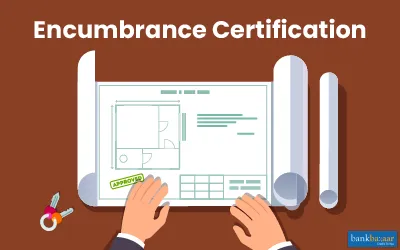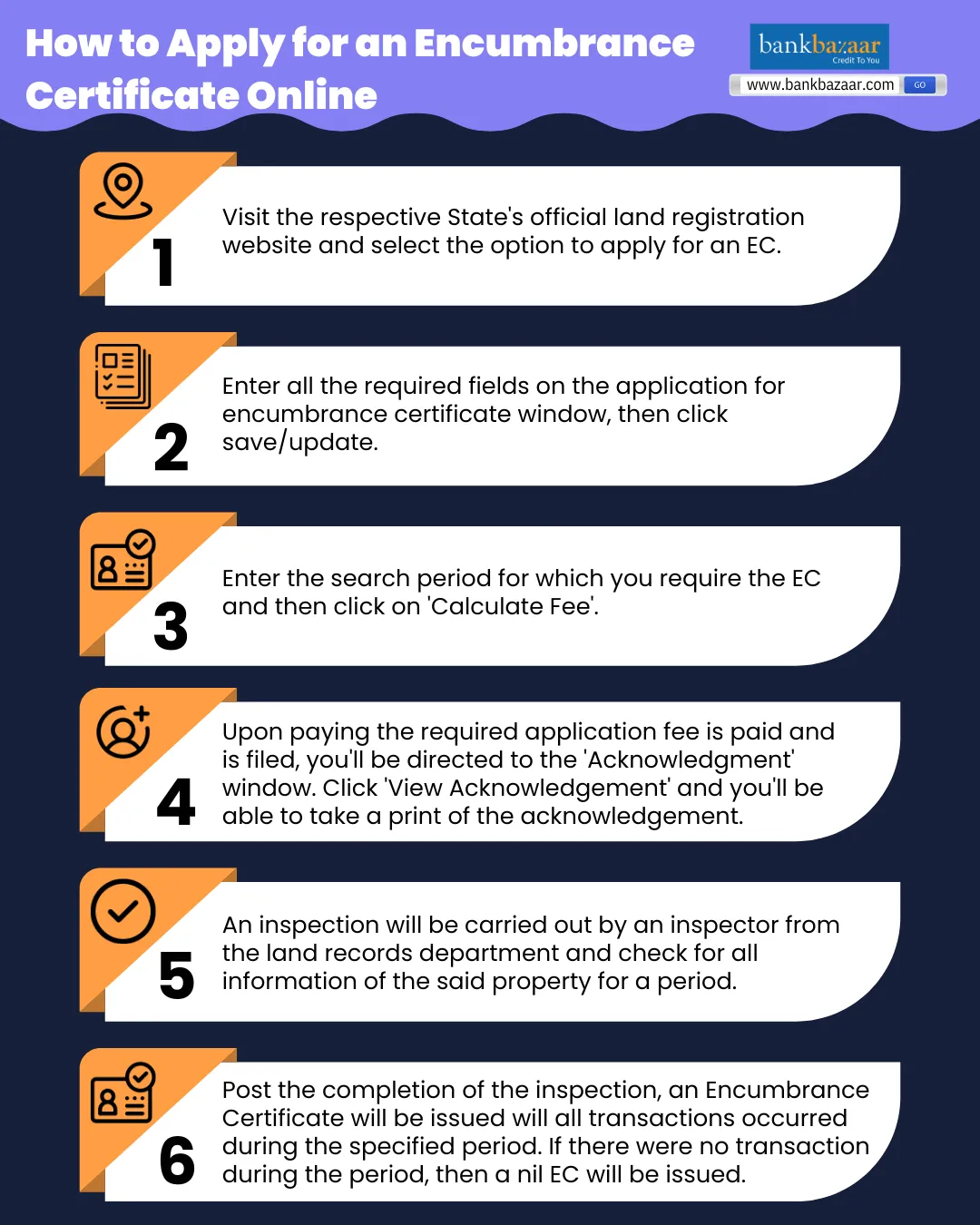Encumbrance Certificate (EC)
What is an Encumbrance Certificate?
An Encumbrance Certificate (EC) is a legal document that provides a detailed history of a property's ownership and any financial or legal claims against it. It reveals any encumbrances such as mortgages, loans, legal disputes, or outstanding taxes.
When you buy a property, it is very important to check if there are any legal complications associated with it. If you are wondering how as a buyer you can get access to this information, then an Encumbrance Certificate (EC) will help you find out if there are any charges created on the property.

If a property is purchased by availing a mortgage or if it has been pledged, the lender will add a "Lien" or a charge to the property. This will ensure that the borrower/property owner does not sell the property until the mortgage is paid in full.
Why is an Encumbrance Certificate Required?
Before buying a property, you must ensure that the property has a clear title. Getting an Encumbrance Certificate will assure you that the property you wish to buy is free from such financial or legal liability.
If you notice a charge on the EC, it is important to rectify it before you make the purchase. It will also help you find out if there are any existing owners who can legally claim the property. Apart from that, if you are planning on availing a loan to buy a property, an EC is one of the documents you will be required to submit to your lender.
Types of encumbrance certificates
There are two types of encumbrance certificates. They are:
- Form 15
- Form 16
The sub-registrar's office issues an encumbrance certificate on Form 15 if a property has any encumbrances during the period for which the applicant has sought a certificate. While a nil-encumbrance certificate is issued on Form 16 by the same office if a property has not registered any encumbrances during the period for which the applicant has sought a certificate
What is a Nil Encumbrance Certificate?
When you apply for an Encumbrance Certificate, you will be asked to specify the period for which you need the information.
If there are no charges placed on the property during the requested period, a ‘Nil Encumbrance Certificate’ will be issued. This means that no lender has placed a lien on the property during that period.
What is the Application Fee to Get an Encumbrance Certificate?
The application fee to get an Encumbrance Certificate differs from state to state. It depends on the location of the property and the state government that governs it. However, the fees to get an EC in some of the popular states are:
State | Fees |
Andhra Pradesh and Telangana (as on 17 August 2013) | Search and issue of certified EC copy- Rs.200 per certificate Search and issue of EC copy up to 30 years- Rs.200 per certificate More than 30 years- Rs.500 per certificate |
Kerala (As on 31 March 2018) | Single search and copy- Rs.10 Extra sheets (over first 2 sheets used)- Rs.10 per sheet |
Note: Please check with your respective authorities for the updated fees and charges applicable.
How to Apply for an Encumbrance Certificate Online
The steps to apply for an Encumbrance Certificate differ from one state to another. A few states in the country allow users to apply for an EC online. If you cannot apply for an Encumbrance Certificate online in your state, you must visit the respective Sub-Registrar's Office.
Below is the procedure to apply for an Encumbrance Certificate online:
- Visit the respective State's official land registration website and select the option to apply for an EC.
- Enter all the required fields on the application for encumbrance certificate window, then click save/update.
- Enter the search period for which you require the EC and then click on 'Calculate Fee'.
- Upon paying the required application fee is paid and is filed, you'll be directed to the 'Acknowledgment' window. Click 'View Acknowledgement' and you'll be able to take a print of the acknowledgement.
- An inspection will be carried out by an inspector from the land records department and check for all information of the said property for a period.
- Post the completion of the inspection, an Encumbrance Certificate will be issued will all transactions occurred during the specified period. If there were no transaction during the period, then a nil EC will be issued.
Which States Issue Online Encumbrance Certificates?
Encumbrance certificates are primarily granted physically throughout India, except for a few states. Andhra Pradesh, Odisha, Kerala, Puducherry, Tamil Nadu, and Telangana are among the states that provide encumbrance certificates online.
Following technical issues with the state's online system, Kaveri Online Service, the Karnataka government opted to return to the offline method for the issuance of encumbrance certificates and other property-related papers on 10 June 2020.
Due to the site's failure, the state had also permitted farmers in Karnataka to apply at a later date. Property registrations in the state's capital, Bengaluru, was also affected by the problem
ENCUMBRANCE CERTIFICATE IN OTHER STATES
How to Apply for Encumbrance Certificate Offline
The procedure that must be followed to apply for an EC offline is mentioned below:
- Visit the respective Sub-Registrar's Office (the jurisdiction depends on the location of the property).
- Submit the duly filled Form 22.
- You will be required to enter details such as the names of the seller and buyer, property details, the type of document you are requesting for (in this case, EC), etc.
- Pay the required fee at the counter.
- Once your application is successfully submitted, you will get a reference/acknowledgment number. You can use this number to track the status of the application online.

How to Track Encumbrance Certificate Status
The steps to track the status of your EC application differs from one website to another. Most of the government websites that allow you to apply for an Encumbrance Certificate online will let you track the status of the application. The procedure is as follows:
For example, the official Kerala Government Website allows its users to check the status online. The steps are as follows:
- Choose "EC Status" under the "Encumbrance Certificate" option available under the "Certificate" menu.
- Enter the Transaction ID provided to you when you submitted the application, enter the captcha, and click on "Check Status". The certificate will be displayed on the screen and you will be able to download it in PDF format.
How Long Will It Take to Get an Encumbrance Certificate?
As mentioned earlier, the process to obtain an EC differs from one place to another. If you apply for an EC in person at a Sub-Registrar's Office, you will get the certificate within 15 to 30 days.
However, if you apply for an EC online, you will get it faster. Online applications usually take 2 to 3 working days to be processed.
How to Download Encumbrance Certificate for Your Property
As mentioned earlier, if the respective State Government website allows you to track the status of your EC application online, you will be able to download the file once it is generated.
Documents Required to Get an Encumbrance Certificate
Some of the documents you would need while applying for an Encumbrance Certificate are:
- Property details and its title deed details.
- The property sale deed/gift deed/partition deed/release deed if a deed has been executed previously.
- The deed number upon registration containing the date and book number along with the signature of the applicant.
- Property registration document.
- Address proof of the applicant.
Please visit the nearest Sub-Registrar's Office to know more about the Encumbrance Certificate in your region.

FAQs on Encumbrance Certificate
- What is an Encumbrance Certificate?
The Department of Registration and Stamping of respective states issues the Encumbrance Certificate which is a legal document that ensures the property is free from legal liability.
- Which information is not included in the encumbrance certificate?
Information, such as house loan information and family settlements that are not present in SRO are also not included in the Encumbrance certificate.
- How long will it take to get an Encumbrance Certificate?
It takes 15 to 30 days and two to three business days to get the Encumbrance Certificate through offline and online mode, respectively.
- How many different kinds of Encumbrance Certificates are there?
There are mainly two different types of Encumbrance Certificates, which are Form 15 and 16. Form 15 is a property that has recorded any encumbrances during a specific period, while the other one is for those properties that has not registered encumbrances during the required period.
- What is the difference between EC and property tax receipt?
Both Encumbrance Certificate and property tax receipt are required for undertaking mortgage or property transactions. But the main difference between EC and property tax receipt is that ownership title free from legal and monetary charges are proved by EC, while the regular payment of specific tax to the concerned authority is indicated by the property tax.
- Can I get an encumbrance certificate after I buy the house?
Yes, you can obtain the encumbrance certificate after purchasing a house, but it is recommended to get it before to determine the presence of any owner that helps in claiming the legal title of the property. Obtaining EC certificate after purchasing the house ensures that the name has been recorded by SRO
- Can I get EC through online mode?
Yes, you can get the EC through online mode only if your state supports it. Only a few states support online EC by downloading it through official land record and registration portal. The states that allow digital EC are Karnataka, Maharashtra, Kerala, Andhra Pradesh, Telangana, Madhya Pradesh, Odisha, Tamil Nadu, and Gujarat.
- Is Encumbrance Certificate required for inherited or gifted property?
You need to submit the Encumbrance Certificate anytime you purchase or sell the property and the EC will mention how the property has been possessed by you, whether through gift, inheritance, new purchase, or resale.

Disclaimer
Credit Card:
Credit Score:
Personal Loan:
Home Loan:
Fixed Deposit:
Copyright © 2026 BankBazaar.com.
